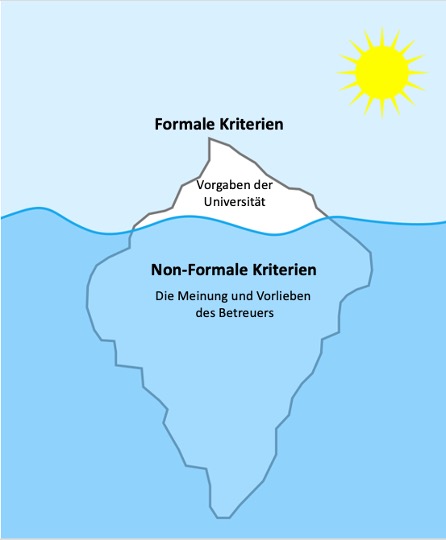It’s the big moment before graduation: submitting your bachelor’s or master’s thesis. Many students want to gild their grade again with it or they just want to see what they can do and get the best possible grade.
Lately I have received numerous calls about what to look for in an assessment and how a bachelor’s or master’s thesis is actually rated. I want to show my experience in this article. In my opinion, there are formal and informal criteria.

Formal criteria
The criteria of the formal evaluation are often precisely documented and you can find them on the respective pages of the university. In my case, for example:
- structuring
- Reasoning
- Content clarity
- Literature processing
- Complexity and novelty of the topic
- Correctness of the statements
- Quotes and formatting
- spelling, orthography
- Style / linguistic expression
- Content (this is the largest block and is explained by me in the non-formal criteria)
You can actually meet these criteria yourself very well. Make sure that you use clean language and that you structure your work in a logical manner. You should also use methods such as interviews or literature analysis properly. There are numerous tips on this on the Internet and on my blog, which you just have to follow. Here reading tip:
Non-formal criteria
An expert opinion must always be prepared for a bachelor’s or master’s thesis. You have to explain what is excellent, very good or just good about your work, but what is also less successful. In the end, it depends on how you relate the positive and negative aspects of work to one another and how you weight them. How one evaluates certain facts is also often subjective. Some prefer the literature analysis according to Fettke and others according to Webster and Watson. The content can also always be viewed subjectively. For example, some journals really didn’t like my research papers and others found them very valuable. It’s like good wine: it’s in the eye of the beholder!
Every single bachelor or master thesis could theoretically be top in terms of content or fail! This differs depending on the supervisor!
It generally helps: If you have a lot of contact with the supervisor, he of course does not see the work for the first time when it is submitted. The bachelor’s or master’s thesis submitted at the end should already have a comprehensive feedback cycle with the supervisor behind it.
My advice: Always coordinate carefully with the supervisor. Content-related points can often be seen subjectively and represent the largest part of the evaluation. Find out exactly how your supervisor wants it. It awards the grade and is therefore the measure of all things!
Conclusion
You notice that the evaluation of a bachelor’s or master’s thesis is not easy and the formal criteria are only a fraction. In the end, a lot depends on the supervisor and you should therefore coordinate closely with the supervisor. So always try to get a lot of feedback and to incorporate the supervisor’s wishes or to convince him of your solution. After submitting the Bachelor’s or Master’s thesis, grades are often given without any surprises.
[student] [fotolia]


